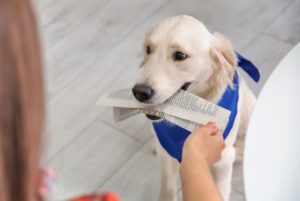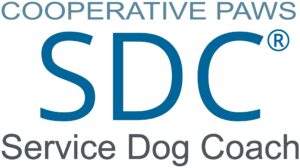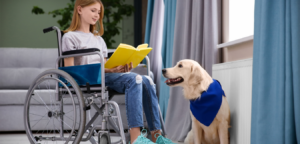Call us at: 508 901 1192
Service Dogs & Therapy Pets

What is a service dog?
Service dogs are defined in the Americans with Disabilities Act and are dogs that are specifically trained to help people with disabilities. For example, service dogs can be trained to help people who have PTSD, mobility impairments, are deaf or hard of hearing, have diabetes or many other conditions.
Emotional support dogs and therapy dogs are not service dogs.
26% of the population in the USA lives with a disability and while many people would benefit from the assistance a service dog can provide, obtaining one can be time consuming and costly. Some accredited members of Assistance Dogs International (the organization which sets standards for assistance dogs) do provide services whereby they help an owner trained service dog, but many will not. The result is that if you’re seeking a service dog, you may be unable to use your own dog who is trainable and instead, end up with a different dog with whom you haven’t already bonded.
While Therapy Dogs are expected to be well trained (and Girl Friday ACK can help with that!) they are neither task trained nor given any special access rights.
Girl Friday is excited to announce that Als Allan is one of a small group of committed positive reinforcement dog trainers accredited by the esteemed Veronica Sanchez through her organization Cooperative Paws as a certified Service Dog Coach. Girl Friday ACK is available to help people with disabilities train their own dog to assist them as a mobility assistance or hearing alert service dog.
Not all dogs are suitable for public access work but even if that is the case, a skilled canine companion can provide immeasurable help at home.
How do I train my own Service Dog?
In order for me to coach you on training your service dog, you will need to meet certain criteria.
Service Dog Training Requirements for the Owner:
- Have a disability as defined by the Americans with Disabilities Act
- Able to participate in training lessons over an extended period of time. The initial training can take a year, two, or even longer.
- Able to commit time to practicing with your dog regularly between appointments.
- Aware that you may end up with a dog that can only help at home or in places pets are allowed. Up to 50% of service dog candidates in programs are not able to complete training and work in places pets are not permitted.
- Willing to wait until we evaluate your dog’s suitability and help you train your dog foundation skills before putting service dog identification on your dog and before taking your dog to places pets are not permitted.
- Have support from your licensed healthcare provider for use of a service dog.
- No history of aggression towards dogs, people or other animals.
- Easily trained.
- A breed or mix likely to have characteristics suitable for service work such as Labradors and Golden retrievers. Each dog is assessed as an individual but some breeds are more likely to exhibit characteristics suitable for service work than others.
- No history of any serious behavior problems like fear or separation anxiety
- Under age 4, physically healthy.





